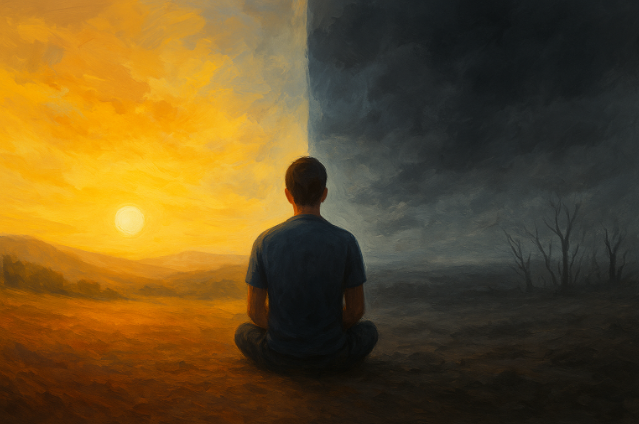
There was once a time when we humans didn’t just live in this world—we truly felt it. Our spirits were devoted to exploring life’s meaning, sitting in silence, and absorbing its depth. We expressed emotions without filters or fear of judgment. Back then, we were what we truly were—not the reflections of what we thought we were supposed to be.
But today, life doesn’t feel like life anymore. It feels like a performance. We no longer live and feel, we function like programmed machines. The true meaning of life is caged by our own expectations. We are not the same humans we once were. Something has changed us drastically. Somewhere along the way, we lost our true identity. The life we now live is far removed from the essence of what life was meant to be.
But what caused this shift? Why are we no longer who we used to be? Is it a truth from the past that we refuse to accept—or is it modernization that has reshaped us? Have our values been lost, or simply modified?
Let us look deeper into the aspects of life that may have contributed to this transformation.
When Power Took Over Connection
In the beginning, survival was our only instinct. But as humans evolved, survival turned into connection. People lived collectively, shared, and protected one another. Emotions were valued—happiness was shared, and grief was mourned together.
But this harmony changed with the rise of agriculture and land ownership. Suddenly, “mine and yours” replaced “ours.” Power shifted from responsibility to domination. Leaders were no longer chosen for guidance but began ruling for control. Hierarchies grew, rules were made, and slowly the natural connection between people faded.
Over centuries, this system grew into nations and empires—built not on shared humanity, but on dominance and control. Power, once a tool of responsibility, became addictive, and in this addiction, we lost the spirit of connection.
When We Fed Our Hunger for Power with Money
Money was not always evil. It began as a useful tool of exchange—first bartering, then coins. But when rulers realized money could be controlled, it became a weapon. Control of money meant control of people.
Slowly, money began defining success. It no longer mattered how talented or wise you were—only how much wealth you had. Experience, wisdom, and values were pushed aside as greed grew. Money stopped being a tool for life and became the very measure of life. And with this, humanity drifted even further from its true self.
When Life Became a Stage
As money and power took center stage, life itself turned into a performance. People began acting rather than living. They smiled when they weren’t happy, acted strong while breaking inside, and displayed wealth or status while drowning in emptiness.
The idea of being real was replaced by the fear of judgment. Instead of building life around peace, joy, and connection, we built it around appearances. Routines became rehearsed lines, and success became an image to maintain. Even when alone, we continued acting for an invisible audience.
Life stopped being about feeling alive—and became about looking alive.
When Emotions Became Burdens Instead of Gifts
Once, emotions were our greatest strength. They helped us connect, share, and understand one another. Today, they are seen as weaknesses. We are taught to hide our tears, bury our fears, and wear the mask of “I’m fine.”
This culture of silence has created loneliness in the middle of crowds. We scroll through screens instead of sharing our hearts. Social media became our new mirror, showing only filtered and edited lives. Happiness became loud and performative, while quiet joy was forgotten.
Emotions, meant to guide us, are now treated as problems to hide—making us emotionally numb and disconnected from life’s truth.
If we keep living this way—pretending instead of feeling, competing instead of connecting, chasing instead of living—we will drift further away from life’s true meaning.
It is time to pause. To breathe. To look at the sky. To feel the wind. To taste our food slowly. To laugh without reason. To sit in silence without restlessness. These are not “small things.” These are life.
We must unlearn the idea that we are here to perform and relearn that we are here to live. Only then will we realize that life never lost its meaning—we simply stopped noticing it.
“Life’s meaning is never lost, it is only hidden behind the masks we choose to wear.”
